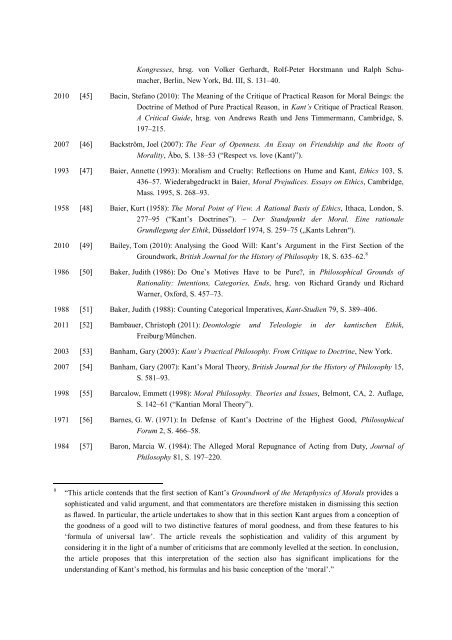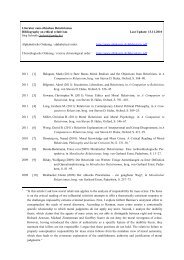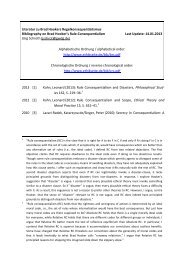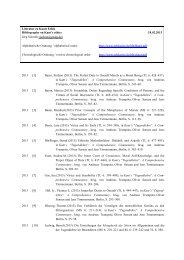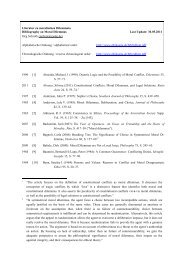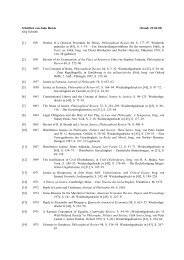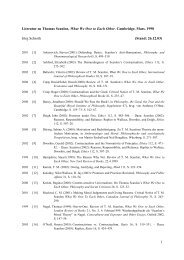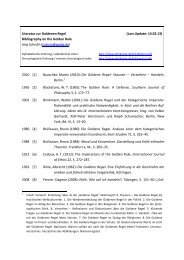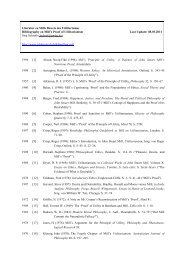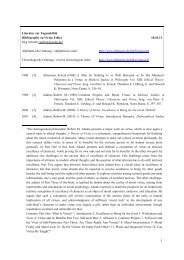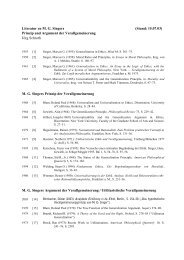Literatur zu Kants Ethik - Ethikseite
Literatur zu Kants Ethik - Ethikseite
Literatur zu Kants Ethik - Ethikseite
You also want an ePaper? Increase the reach of your titles
YUMPU automatically turns print PDFs into web optimized ePapers that Google loves.
Kongresses, hrsg. von Volker Gerhardt, Rolf-Peter Horstmann und Ralph Schumacher,<br />
Berlin, New York, Bd. III, S. 131–40.<br />
2010 [45] Bacin, Stefano (2010): The Meaning of the Critique of Practical Reason for Moral Beings: the<br />
Doctrine of Method of Pure Practical Reason, in Kant’s Critique of Practical Reason.<br />
A Critical Guide, hrsg. von Andrews Reath und Jens Timmermann, Cambridge, S.<br />
197–215.<br />
2007 [46] Backström, Joel (2007): The Fear of Openness. An Essay on Friendship and the Roots of<br />
Morality, Åbo, S. 138–53 (“Respect vs. love (Kant)”).<br />
1993 [47] Baier, Annette (1993): Moralism and Cruelty: Reflections on Hume and Kant, Ethics 103, S.<br />
436–57. Wiederabgedruckt in Baier, Moral Prejudices. Essays on Ethics, Cambridge,<br />
Mass. 1995, S. 268–93.<br />
1958 [48] Baier, Kurt (1958): The Moral Point of View. A Rational Basis of Ethics, Ithaca, London, S.<br />
277–95 (“Kant’s Doctrines”). – Der Standpunkt der Moral. Eine rationale<br />
Grundlegung der <strong>Ethik</strong>, Düsseldorf 1974, S. 259–75 („<strong>Kants</strong> Lehren“).<br />
2010 [49] Bailey, Tom (2010): Analysing the Good Will: Kant’s Argument in the First Section of the<br />
Groundwork, British Journal for the History of Philosophy 18, S. 635–62. 8<br />
1986 [50] Baker, Judith (1986): Do One’s Motives Have to be Pure?, in Philosophical Grounds of<br />
Rationality: Intentions, Categories, Ends, hrsg. von Richard Grandy und Richard<br />
Warner, Oxford, S. 457–73.<br />
1988 [51] Baker, Judith (1988): Counting Categorical Imperatives, Kant-Studien 79, S. 389–406.<br />
2011 [52] Bambauer, Christoph (2011): Deontologie und Teleologie in der kantischen <strong>Ethik</strong>,<br />
Freiburg/München.<br />
2003 [53] Banham, Gary (2003): Kant’s Practical Philosophy. From Critique to Doctrine, New York.<br />
2007 [54] Banham, Gary (2007): Kant’s Moral Theory, British Journal for the History of Philosophy 15,<br />
S. 581–93.<br />
1998 [55] Barcalow, Emmett (1998): Moral Philosophy. Theories and Issues, Belmont, CA, 2. Auflage,<br />
S. 142–61 (“Kantian Moral Theory”).<br />
1971 [56] Barnes, G. W. (1971): In Defense of Kant’s Doctrine of the Highest Good, Philosophical<br />
Forum 2, S. 466–58.<br />
1984 [57] Baron, Marcia W. (1984): The Alleged Moral Repugnance of Acting from Duty, Journal of<br />
Philosophy 81, S. 197–220.<br />
8 “This article contends that the first section of Kant’s Groundwork of the Metaphysics of Morals provides a<br />
sophisticated and valid argument, and that commentators are therefore mistaken in dismissing this section<br />
as flawed. In particular, the article undertakes to show that in this section Kant argues from a conception of<br />
the goodness of a good will to two distinctive features of moral goodness, and from these features to his<br />
‘formula of universal law’. The article reveals the sophistication and validity of this argument by<br />
considering it in the light of a number of criticisms that are commonly levelled at the section. In conclusion,<br />
the article proposes that this interpretation of the section also has significant implications for the<br />
understanding of Kant’s method, his formulas and his basic conception of the ‘moral’.”


